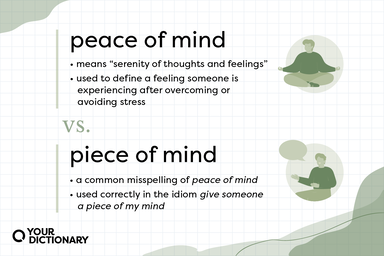Mind Definition
- A capacity or inclination to think or act independently:
a reporter with a mind of her own.
- A tendency to be unresponsive to human will:
The car had a mind of its own and seemed to start only when it felt like it.
- To be in agreement about something.
- To have mixed feelings or be undecided about something.
- To remember (something):
tried to bring to mind their happy times together.
- To cause (something) to be remembered or thought of; evoke:
Idioms, Phrasal Verbs Related to Mind
- a mind of (one's) own
- a mind of its own
- be of one mind
- be of two minds
- bring
- never mind
- bear in mind
- be in one's right mind
- be of one mind
- be of two minds
- call to mind
- change one's mind
- give someone a piece of one's mind
- have a good mind to
- have half a mind to
- have in mind
- know one's own mind
- make up one's mind
- meeting of (the) minds
- never mind
- on someone's mind
- out of one's mind
- put someone in mind of
- put one's mind to
- set one's mind on
- take one's mind off
- to one's mind
Origin of Mind
-
From Middle English minde, munde, ȝemunde, from Old English mynd, Ä¡emynd (“memory, remembrance; memorial, record; act of commemoration; thought, purpose; consciousness, mind, intellect"), from Proto-Germanic *mundiz, *gamundiz (“memory, remembrance"), from Proto-Indo-European *méntis (“thought"), from Proto-Indo-European *men- (“to think"). Cognate with Old High German gimunt (“mind, memory"), Danish minde (“memory"), Icelandic minni (“memory, recall, recollection"), Gothic 𐌼𐌿𐌽𐌳𐍃 (munds, “memory, mind"), Old English myntan (“to mean, intend, purpose, determine, resolve"), Latin mÄ“ns (“mind, reason"), Albanian mënd (“mind, reason"). More at mint.
From Wiktionary
-
Middle English minde from Old English gemynd men-1 in Indo-European roots
From American Heritage Dictionary of the English Language, 5th Edition
Find Similar Words
Find similar words to mind using the buttons below.





